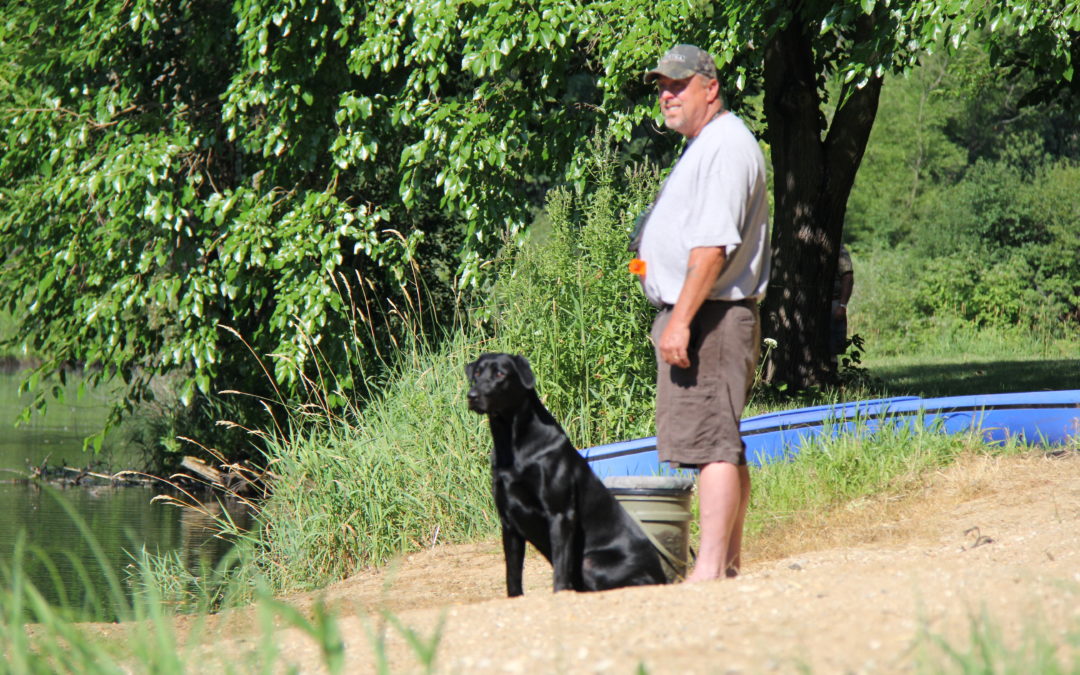Getting and Keeping Your Dog Ready for Hunting Season?
Whether your dog is a veteran or a beginning bird dog, keeping your canine’s skills fresh throughout the year is important. Are you doing everything it takes to make sure your dog is ready to go and make the most of the limited time frame of hunting season? Listed here are skills you should work on during the summer to ensure dog is ready.
Functional Obedience
Regardless of your dog’s role in the household, he or she should practice obedience on a daily basis. For hunting dogs, field skills should be incorporated into these sessions. For instance, instead of simply asking your dog to “sit,” have him or her sit on an object, such as a tree stump. Instead of asking your dog to “heel” during a walk, put on waders and have your pet heel through a shallow pond. Obedience drills such as these will keep your dog’s hunting skills fresh.
Steadying / Honoring
Throughout your dog’s training, he or she learns that it is desirable to excitedly chase a bumper or dummy, which can decrease your dog’s steadiness and ability to honor your commands. Instead of throwing multiple retrieves everyday, throw numerous bumpers but only allow your dog to bring back 2 – 3 each session.
Lining
During the off season, dogs can become lazy and lose their good habits. One such habit is lining, which is running a straight, clean line towards the target. Work on this skill by throwing a bumper along a fence or building, which will force your dog to run as straight a line as possible. Increase the difficulty of this drill by adding obstacles for your dog to run over, such as a fallen log.
Marking
You will know your dog is almost ready for hunting season when he or she is marking well. To keep these skills fresh, choose more difficult marks that will challenge your dog. For instance, instead of tossing a bumper in an open field, throw the bumper from the field into thick cover which will simulate real-life scenarios.
Handling
Is your dog able to follow your hand signals and whistle reliably? Working on these skills in the off-season can pay huge dividends. A popular drill utilizes a real or imaginary baseball diamond. With your dog near the pitcher’s mound and you at home plate, use hand signals and your whistle to direct your dog to first, second, and third base. Eventually, use these cues to direct your dog towards hidden bumpers for retrieval, encouraging your pet to bring them directly to your hand.
Birds
If you use bumpers or dummies during the off-season, make sure to re-introduce real birds before the first hunt of the year. One simple way to incorporate game birds is to freeze carcasses throughout the year and bring them out for special training days. Bird wings can also be used.
Socialization
Make sure your dog is ready for everything that is encountered during a hunt. Like birds, you should reintroduce your dog to the sound of a gun before the first hunt of the season. Simulate a hunting scenario as closely as possible by firing multiple shots. Additionally, if you hunt in a boat make sure to incorporate training drills in the boat (in water or on dry land) before the first outing. Finally, make sure your dog remembers the purpose of the decoy by spending time running decoy drills. First, set up 6 – 8 decoys and then throw bumpers in front of, into, and past the group. Your dog should learn that birds are found in areas besides decoys for optimal skills.
Heat Acclimation
Be careful with your dog during the warmer months, and remember that your pet won’t have the same heat tolerance in June as he or she will in August. Start slowly, and keep your dog cool at all times. Train in the mornings or evenings and avoid direct sunlight. Utilize water training to get your dog into shape, such as by going on long retrieves. This will provide a better workout and will generally be safer than running your dog in warm weather.
Not sure what you should be doing or Need Help? Give Bull Valley Retrievers a call to help with your training regimen.

